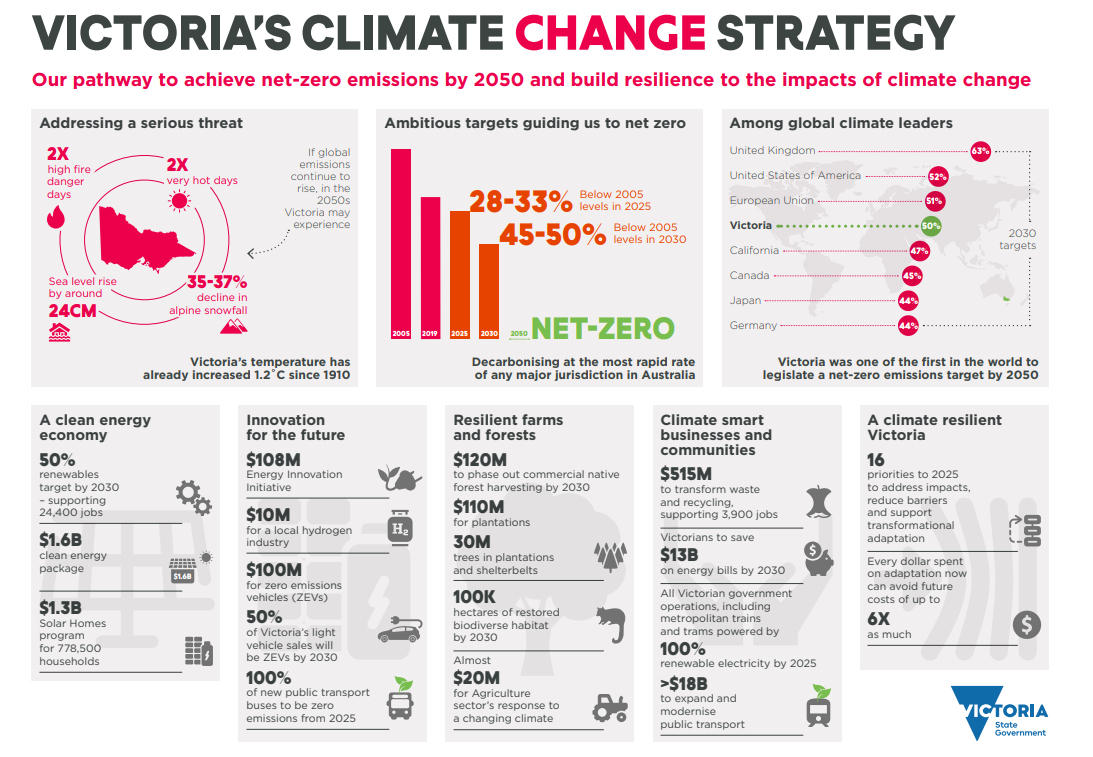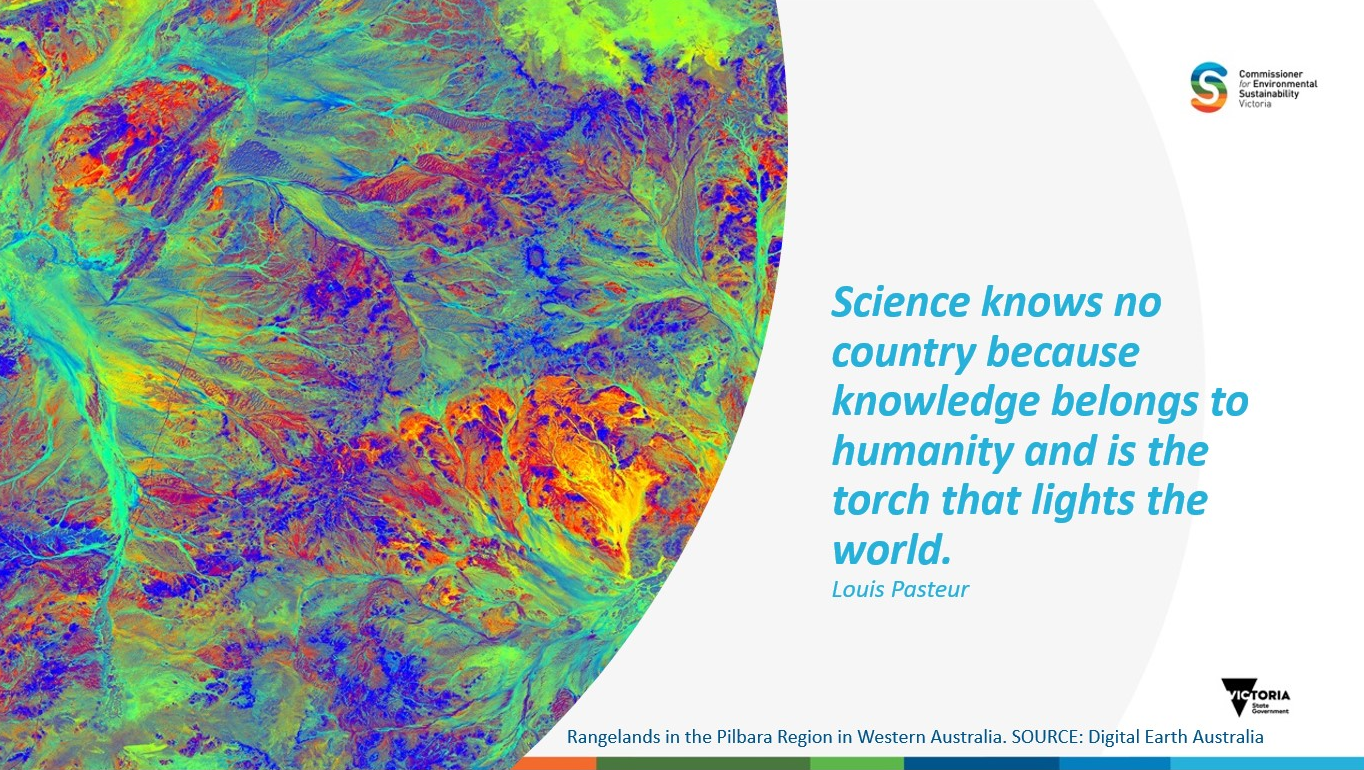Dr Gillian Sparkes AM, Commissioner for Environmental Sustainability joined The Hon. Lily D’Ambrosio, Minister for Energy, Environment and Climate Change to deliver keynote presentations for the Environment Institute Australia New Zealand (EIANZ) Annual Conference 2021 on Tuesday 9 November 2021.
Tying into the conference theme – ‘How good is science!?’ – Aunty Diane Kerr from the Wurundjeri Woi-wurrung Cultural Heritage Aboriginal Corporation opened the conference with a warming Welcome to Country, which acknowledged how science information is already embedded in dreamtime stories of her people.
The Minister and Commissioner’s presentations articulated the current ways science informs policy in Victoria and the measures taking place to elevate science research into the future. Two critical aspects to mitigating, adapting and minimising climate change are for strong targets to be set and legislated, and then investment in science to know how and where to act and adapt.
Science is at the heart of Victoria’s Climate Change Strategy
Minister D’Ambrosio presented on the role of science in the Victorian Government. Minister D’Ambrosio stated “good science is at the heart of our decision making - we are drawing on the expertise of our State’s scientists. We are the only Australian state to legislate a commitment to set new climate change policies and emissions targets every five years. So far, we have cut Victoria’s emissions by 25 per cent from 2005 levels, beating our 2020 emissions target by two years. And we’ve done this while growing our economy.”
The Victorian Government has commitment to cut emissions by 28–33 per cent by 2025, and by 45–50 per cent by 2030 on the way to net-zero emissions by 2050. The government supports investment in science and research to achieve our targets.

Science for Sustainable Development
Dr Sparkes’ presentation followed the keynote address by Minister D’Ambrosio. As Commissioner for Environmental Sustainability, an independent statutory role that reports and advises the Minister for Environment, Energy and Climate Change and inform the community on the condition of Victoria’s natural environment. A key role for Dr Sparkes is to make recommendations based on the periodic ‘state of’ environment reports that will enhance Victoria’s natural environment and support the ecologically sustainable development of Victoria.
Dr Sparkes discussed the level of sophistication that is being applied to the scientific endeavour to support and enhance Victoria’s legislative and policy frameworks in place. “You need both targets and science to tackle climate change” said Dr Sparkes. Victoria is invested in both.
In her presentation Dr Sparkes focused on her work as Commissioner, covering outcomes of the State of the Environment 2018 report, the guiding framework for Victorian State of the Environment reporting to 2024 - Science for Sustainable Development – which includes applying the United Nations Sustainable Development Goals (SDGs), along with traditional and digital scientific methods including earth observation and spatial technologies to monitor, protect and adapt in a climate change affected environment to support our environment and communities.
Dr Sparkes highlighted that the first report being delivered under the Science for Sustainable Development framework approach is the Victorian State of the Marine and Coastal Environment (SMCE) 2021 Report. This is the first of a series of reports, including the 2023 Victorian State of the Environment report that will be prepared according to this approach. The SMCE 2021 report will be released in December 2021.
Dr Sparkes referred to the importance for the Commissioner’s work, of the 2021 report by Working Group 1 of the Intergovernmental Panel on Climate Change (IPCC), the 6th Assessment report (AR6) and the comprehensive assessment of the physical science associated with climate change. Advances in science have enabled many statements on the causes and effects of climate change to be made with increased confidence in AR6 compared with previous reports. This report finds that global surface temperatures in the last decade are now warmer than at any time during the last 100,000 years. The window for action is rapidly closing to keep temperatures below the 2 degrees Celsius above pre-industrial levels and to pursue no more than a 1.5 degree Celsius increase with global surface temperatures now about 1.1 degree Celsius higher than in 1850-1900 with human activities explaining the observed warming.
Dr Sparkes articulated that science is required across the board to predict, prevent, respond to, adapt and mitigate the impact of climate change in both a local and global context, highlighting the “critical role space and spatial science and the sector more broadly has and increasingly will have, as a key capability to support nations and communities address climate change mitigation, adaptation and response”.
In talking about the importance of the space and spatial science for business-as-usual environmental management in Australia, beyond the well-established role in emergency response, Dr Sparkes said, “in Victoria, we’re starting to look at earth observation and spatial science in a way that is much more ambitious. This is really transformative work”.
In closing, Dr Sparkes expressed the importance of investment in science and some of the practical implications of the IPCC report findings through the lens of her work in various capacities including as the Victorian Commissioner for Environmental Sustainability, a Board member of the Country Fire Authority (CFA) and Chair of FrontierSI.
Dr Sparkes left the audience to ponder of her favourite quotes, "Science knows no country because knowledge belongs to humanity and is the torch that lights the world" by Louis Pasteur.

